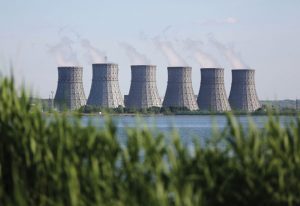BLOOMBERG
Nuclear powers within the Group of Seven (G-7) nations pledged to end Russia’s dominance over global atomic-fuel markets, potentially cutting off a critical source of geopolitical currency for Russian President Vladimir Putin more than a year after his invasion of Ukraine.
Canada, France, Japan, the UK and US committed to jointly dislodge Russia from global nuclear supply chains. Even amid Western sanctions over the war, the Kremlin’s state-owned nuclear giant, Rosatom Corp, has remained the world’s biggest exporter of reactors and fuel.
“This agreement will be used as the basis for pushing Putin out of the nuclear fuel market entirely, and doing so as quickly as possible,†according to a statement from UK Energy Secretary Grant Shapps. The commitment took shape at a nuclear-industry conference convened on the sidelines of the G-7 meeting in the Japanese city of Sapporo.
The US and its European allies have been weighing tough sanctions targeting Russia’s nuclear sector for more than a year but have struggled to strike an agreement. The concern is that shutting off their own nuclear industries from Russian supplies would be too economically painful.
Rosatom provided about a quarter of enriched uranium needed for the 92 reactors in the US in 2021. In Europe, utilities that generate power for countries with about 100 million inhabitants still rely on the company.
“We’ve allowed ourselves to become dependent on too few sources of supply,†said Dan Poneman, Chief Executive Officer of Centrus Energy Corp, a company trying to reboot a US uranium-enrichment industry. “It will take four or five years to replace that capacity that they world has come to rely on.â€
Russia has come under increased pressure at the International Atomic Energy Agency (IAEA) for endangering nuclear security following the seizure of Europe’s biggest atomic-power plant early in its war against Ukraine. The Zaporizhzhia station, with six reactors designed to generate a fifth of Ukraine’s electricity, was subsequently targeted by artillery and missiles, threatening to provoke a radiological accident. It’s now being operated by engineers from Rosatom.
“Russia has demonstrated it is an unreliable supplier,†US Secretary of Energy Jennifer Granholm said. Nations need to re-work global nuclear supply chains to “work with companies and countries that share their values,†she said.
While some European nations — including Bulgaria, Finland and Slovakia — have taken steps to diversify away from Russian nuclear fuel, Rosatom has been building a pipeline for future supplies with new reactor projects across Africa and Asia. Rosatom isn’t handicapped by non-proliferation rules imposed by the US Department of Energy.
 The Gulf Time Newspaper One of the finest business newspapers in the UAE brought to you by our professional writers and editors.
The Gulf Time Newspaper One of the finest business newspapers in the UAE brought to you by our professional writers and editors.
